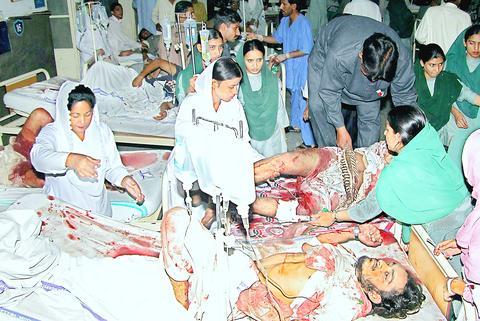Two bombs planted in a car and motorcycle exploded at a gathering of Sunni Muslim radicals in central Pakistan before dawn yesterday, killing at least 40 people and wounding about 100 others in what police suspected was a sectarian attack.
The blasts ripped through a crowd of mourners leaving the overnight rally attended by several thousand in the city of Multan to mark the first anniversary of the shooting of extremist Sunni religious leader Azam Tariq, who was gunned down on the outskirts of Islamabad last October.

PHOTO: EPA
"It was dark and people were screaming for help," said one witness. "It was utter chaos."
About 2,000 angry Sunnis gathered outside a hospital where victims of the explosions in the city of Multan were taken, shouting "Shiites are infidels!" and slogans against the government, witnesses said.
The bombings came less than a week after a suicide attack left 31 dead at a Shiite mosque in the eastern city of Sialkot on Oct. 2 and Information Minister Sheikh Rashid Ahmed said it could have been a sectarian act of revenge.
Prime Minister Shaukat Aziz convened an emergency meeting and the Interior Ministry would propose a ban on large religious gatherings, Interior Minister Aftab Ahmed Khan Sherpao said.
The rally had ended and people were dispersing in pre-dawn darkness from a meeting ground in the Rasheedabad area when the car bomb exploded, said Sikander Hayat, police chief in Multan.
Two minutes later a second bomb attached to a motorcycle went off, deputy city police chief Arshad Hameed said.
Large patches of blood stained the ground and pieces of flesh lay scattered around. Nearby houses and shops were damaged.
Jamil Usmani, 26, who had been standing in a nearby parking lot with friends, said a stampede after the bombing caused many injuries.
"The explosion numbed our ears, we saw people falling on each other, everybody was crying, everybody was running," he said. "Many people were injured in the stampede, we started picking them up and asked passing cars for help."
Most of the casualties were followers of Sipah-e-Sahaba Pakistan (Soldiers of Mohammad's Companions), an outlawed Sunni group that Tariq headed and which has been blamed for many bloody attacks on Shiites, who make up about 15 percent of Pakistan's mainly Sunni population of 150 million.
Sipah-e-Sahaba was one of seven militant groups outlawed by Musharraf after he joined the US-led war on terror following the Sept. 11, 2001 attacks on the US.
Like other such organizations, it took another name after being banned -- Millat-e-Islamia (Islamic Nation). The leader of the renamed group, Maulana Muhammad Ahmed Ludhianvi, blamed Shiite radicals for the blast.
He appealed to his followers to remain calm. But addressing thou-sands gathered to offer funeral prayers, he demanded that the government track down those responsible within a week or he would call for a march on Islamabad.
Abdul Jalil Naqvi, a leader of the main Shiite militant group, the ban-ned Islami Tehrik Pakistan, denied the attack was carried out by Shiites and said it was an act of terrorism aimed at inciting a sectarian war.
"We condemn it," he said.
Officials said about 1,000 police were called from other areas, and soldiers were patrolling the city.

A fire caused by a burst gas pipe yesterday spread to several homes and sent a fireball soaring into the sky outside Malaysia’s largest city, injuring more than 100 people. The towering inferno near a gas station in Putra Heights outside Kuala Lumpur was visible for kilometers and lasted for several hours. It happened during a public holiday as Muslims, who are the majority in Malaysia, celebrate the second day of Eid al-Fitr. National oil company Petronas said the fire started at one of its gas pipelines at 8:10am and the affected pipeline was later isolated. Disaster management officials said shutting the

US Vice President J.D. Vance on Friday accused Denmark of not having done enough to protect Greenland, when he visited the strategically placed and resource-rich Danish territory coveted by US President Donald Trump. Vance made his comment during a trip to the Pituffik Space Base in northwestern Greenland, a visit viewed by Copenhagen and Nuuk as a provocation. “Our message to Denmark is very simple: You have not done a good job by the people of Greenland,” Vance told a news conference. “You have under-invested in the people of Greenland, and you have under-invested in the security architecture of this

Japan unveiled a plan on Thursday to evacuate around 120,000 residents and tourists from its southern islets near Taiwan within six days in the event of an “emergency”. The plan was put together as “the security situation surrounding our nation grows severe” and with an “emergency” in mind, the government’s crisis management office said. Exactly what that emergency might be was left unspecified in the plan but it envisages the evacuation of around 120,000 people in five Japanese islets close to Taiwan. China claims Taiwan as part of its territory and has stepped up military pressure in recent years, including

UNREST: The authorities in Turkey arrested 13 Turkish journalists in five days, deported a BBC correspondent and on Thursday arrested a reporter from Sweden Waving flags and chanting slogans, many hundreds of thousands of anti-government demonstrators on Saturday rallied in Istanbul, Turkey, in defence of democracy after the arrest of Istanbul Mayor Ekrem Imamoglu which sparked Turkey’s worst street unrest in more than a decade. Under a cloudless blue sky, vast crowds gathered in Maltepe on the Asian side of Turkey’s biggest city on the eve of the Eid al-Fitr celebration which started yesterday, marking the end of Ramadan. Ozgur Ozel, chairman of the main opposition Republican People’s Party (CHP), which organized the rally, said there were 2.2 million people in the crowd, but